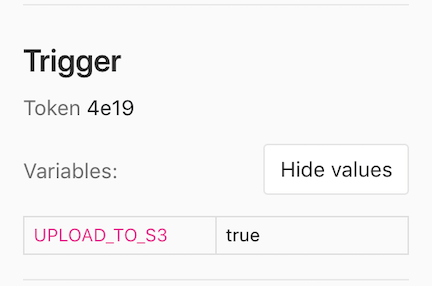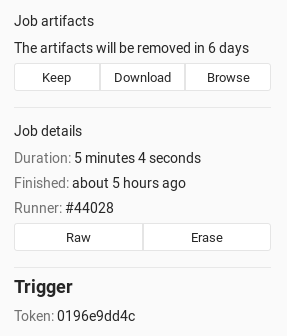Trigger pipelines by using the API (FREE)
To trigger a pipeline for a specific branch or tag, you can use an API call to the pipeline triggers API endpoint.
When authenticating with the API, you can use:
- A trigger token to trigger a branch or tag pipeline.
- A CI/CD job token to trigger a multi-project pipeline.
Create a trigger token
You can trigger a pipeline for a branch or tag by generating a trigger token and using it to authenticate an API call. The token impersonates a user's project access and permissions.
Prerequisite:
- You must have at least the Maintainer role for the project.
To create a trigger token:
- On the top bar, select Menu > Projects and find your project.
- On the left sidebar, select Settings > CI/CD.
- Expand Pipeline triggers.
- Enter a description and select Add trigger.
- You can view and copy the full token for all triggers you have created.
- You can only see the first 4 characters for tokens created by other project members.
WARNING:
It is a security risk to save tokens in plain text in public projects. Potential
attackers could use a trigger token exposed in the .gitlab-ci.yml file to impersonate
the user that created the token. Use masked CI/CD variables
to improve the security of trigger tokens.
Trigger a pipeline
After you create a trigger token, you can use it to trigger pipelines with a tool that can access the API, or a webhook.
Use cURL
You can use cURL to trigger pipelines with the pipeline triggers API endpoint. For example:
-
Use a multiline cURL command:
curl --request POST \ --form token=<token> \ --formref=<ref_name> \ "https://gitlab.example.com/api/v4/projects/<project_id>/trigger/pipeline" -
Use cURL and pass the
<token>and<ref_name>in the query string:curl --request POST \ "https://gitlab.example.com/api/v4/projects/<project_id>/trigger/pipeline?token=<token>&ref=<ref_name>"
In each example, replace:
- The URL with
https://gitlab.comor the URL of your instance. -
<token>with your trigger token. -
<ref_name>with a branch or tag name, likemain. -
<project_id>with your project ID, like123456. The project ID is displayed at the top of every project's landing page.
Use a CI/CD job
You can use a CI/CD job with a triggers token to trigger pipelines when another pipeline runs.
For example, to trigger a pipeline on the main branch of project-B when a tag
is created in project-A, add the following job to project A's .gitlab-ci.yml file:
trigger_pipeline:
stage: deploy
script:
- 'curl --fail --request POST --form token=$MY_TRIGGER_TOKEN --form ref=main "https://gitlab.example.com/api/v4/projects/123456/trigger/pipeline"'
rules:
- if: $CI_COMMIT_TAGIn this example:
-
1234is the project ID forproject-B. The project ID is displayed at the top of every project's landing page. - The
rulescause the job to run every time a tag is added toproject-A. -
MY_TRIGGER_TOKENis a masked CI/CD variables that contains the trigger token.
Use a webhook
To trigger a pipeline from another project's webhook, use a webhook URL like the following for push and tag events:
https://gitlab.example.com/api/v4/projects/9/ref/main/trigger/pipeline?token=TOKENReplace:
- The URL with
https://gitlab.comor the URL of your instance. -
<token>with your trigger token. -
<ref_name>with a branch or tag name, likemain. -
<project_id>with your project ID, like123456. The project ID is displayed at the top of the project's landing page.
The ref in the URL takes precedence over the ref in the webhook payload. The
payload ref is the branch that fired the trigger in the source repository.
You must URL-encode ref if it contains slashes.
Use a webhook payload
- Introduced in GitLab 13.9.
- Feature flag removed in GitLab 13.11.
If you trigger a pipeline by using a webhook, you can access the webhook payload with
the TRIGGER_PAYLOAD predefined CI/CD variable.
The payload is exposed as a file-type variable,
so you can access the data with cat $TRIGGER_PAYLOAD or a similar command.
Pass CI/CD variables in the API call
You can pass any number of CI/CD variables in the trigger API call. These variables have the highest precedence, and override all variables with the same name.
The parameter is of the form variables[key]=value, for example:
curl --request POST \
--form token=TOKEN \
--form ref=main \
--form "variables[UPLOAD_TO_S3]=true" \
"https://gitlab.example.com/api/v4/projects/123456/trigger/pipeline"CI/CD variables in triggered pipelines display on each job's page, but only users with the Owner and Maintainer role can view the values.
Revoke a trigger token
To revoke a trigger token:
- On the top bar, select Menu > Projects and find your project.
- On the left sidebar, select Settings > CI/CD.
- Expand Pipeline triggers.
- To the left of the trigger token you want to revoke, select Revoke ({remove}).
A revoked trigger token cannot be added back.
Configure CI/CD jobs to run in triggered pipelines
To configure when to run jobs in triggered pipelines:
- Use
ruleswith the$CI_PIPELINE_SOURCEpredefined CI/CD variable. - Use
only/exceptkeywords.
$CI_PIPELINE_SOURCE value |
only/except keywords |
Trigger method |
|---|---|---|
trigger |
triggers |
In pipelines triggered with the pipeline triggers API by using a trigger token. |
pipeline |
pipelines |
In multi-project pipelines triggered with the pipeline triggers API by using the $CI_JOB_TOKEN, or by using the trigger keyword in the CI/CD configuration file. |
Additionally, the $CI_PIPELINE_TRIGGERED predefined CI/CD variable is set to true
in pipelines triggered with a trigger token.
See which trigger token was used
You can see which trigger caused a job to run by visiting the single job page. A part of the trigger's token displays on the right of the page, under the job details:
In pipelines triggered with a trigger token, jobs are labeled as triggered in
CI/CD > Jobs.
Troubleshooting
404 not found when triggering a pipeline
A response of {"message":"404 Not Found"} when triggering a pipeline might be caused
by using a personal access token
instead of a trigger token. Create a new trigger token
and use it instead of the personal access token.

